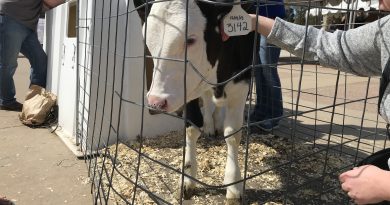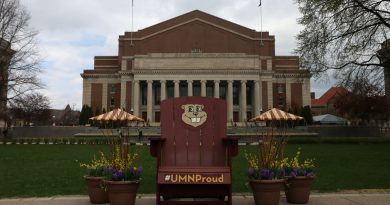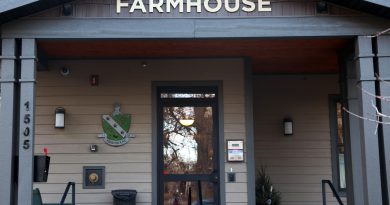Navigating stereotypes: AccessU survey finds Greater Minnesota students avoid discussing politics in classes and say “isolation and discomfort” is main reason they consider leaving
Students who come to the University of Minnesota -Twin Cities from outside the seven-county metro area are more likely to feel uncomfortable talking politics in classroom conversations and say they would benefit from campus resources to address the social and academic needs of rural students, according to an AccessU: Beyond the Cities survey.
The survey, conducted in March, also found that students from Greater Minnesota who considered leaving the Twin Cities campus were more likely than metro-area students to cite isolation and discomfort on campus as the main reason for contemplating that decision.
The survey, sent last month to 5,000 Twin Cities undergraduate students, was designed to understand how the experience of so-called “rural” students on the Twin Cities campus is viewed and whether those students might need dedicated university resources, such as orientation outreach or living and learning communities, to help them adjust to life on a big campus.
A total of 775 students completed the survey. AccessU separated those students into two groups. One group was from the seven-county metro area, which includes Anoka, Carver, Dakota, Hennepin, Ramsey, Scott and Washington counties. The other was from outside that area, defined as Greater Minnesota. Students in both groups were asked the same set of questions about their adjustment to campus, resources, campus and classroom climate and political attitudes.
For the group that included students outside of the metro area, the analysis of data focused only on students from Greater Minnesota — excluding respondents who came from out of state or international students.
The results of the survey cannot be extrapolated to the entire university community because they are “qualitative.” Yet they are useful for understanding how this subset of students from outside the metro-area counties describe their experience and how some metro-area students perceive Greater Minnesota students collectively. The survey was essentially a large-scale interview.
Welcoming campus, a quiet divide?
The survey revealed the university, particularly the St. Paul campus, can be a welcoming place for outstate students. Most students from Greater Minnesota reported they felt included by faculty and instructors in classroom discussions and had a moderately easy transition to the university. Most reported they had not considered leaving.
But within the survey and in extensive comments given at the end – more than 140 from both Greater Minnesota and metro-area students – a more nuanced picture emerged. It revealed the campus can be an isolating environment for students, who navigate stereotypes shaped by a national “urban-rural divide” narrative that, as our survey uncovered, has little to do with how many of those Greater Minnesota students live or think. Access U did not ask students to identify themselves in the comments, but our reporters did call several students after the survey to get on-the-record comments. A story about those interviews will be published later on this site.
Many metro-area students acknowledged these stereotypes openly.
“I believe rural students are generally less accepted in the population of the university because of their political views and personal interests and lifestyle,” wrote one metro-area respondent. “I’ve heard numerous comments about students being called, ‘yeehaw,’ ‘hillbilly,’ ‘redneck,’ etc., in a negative manner. In a way, I feel like coming from a rural background should be considered a marginalized identity on campus.”
Other metro-area student comments in the survey embraced those stereotypes without apologies.
“I do think it can be hard for rural students, but I stand very strongly with my viewpoints and I think anyone who is conservative is most likely racist, sexist, xenophobic, and/or homophobic,” wrote another metro-area student, whose comments, while extreme, were not entirely out of line with other metro-area respondents. “It is good for rural students to attend the University of Minnesota Twin Cities as it is probably more diverse than anything they’ve ever experienced. This may be hard for them, but getting used to the realities of life is always hard and must be done nonetheless. However, I do not think it is necessary or even justified to create separate support for rural students as it will always be far more important to focus on actual marginalized groups such as trans people, queer people, people of color, people with disabilities, low-income people, and women. These are often the groups that face discrimination from rural people and the oppressors do not need more assistance or a larger platform than the oppressed.”
Many Greater Minnesota students reported being judged if they express conservative views or, even if they don’t hold those views, being labeled as a conservative or an extremist simply because they come from outside the Twin Cities.
“Rural students’ safest options are to keep their political views to themselves, especially on the East Bank, because if you let them know your views they automatically say you’re a racist, ruining Planet Earth, or don’t know what you’re talking about if you act conservative,” wrote a Greater Minnesota student. “Even though I consider myself a moderate, even then most students/teachers on East Bank do not like that.”
Others simply expressed gratitude for the survey, thanking AccessU for asking about what they consider the sometimes-difficult adjustments of a rural student to the Twin Cities campus.
“I’m glad this is being brought to light,” wrote one commenter from Greater Minnesota, noting this was the first time anyone had asked about the rural student’s experiences. “I thought I was just weird, and I didn’t think that this was a real issue.”
Isolated and Uncomfortable
The survey asked both metro-area and Greater Minnesota students if they had ever considered leaving the Twin Cities campus, and if so, why.
Of 63 students from outside the seven-county metro area who answered yes, 37 percent said the main reason they wanted to leave was because they were “feeling isolated and uncomfortable on the campus.” To some, this simply meant a lack of friendship connections many suburban students had when they entered as freshmen.
As one respondent from Greater Minnesota wrote: “When you are the only one from your high school in your college, it is incredibly isolating to see kids from neighboring suburbs looking as if the transition to college was a breeze because they had a support system of friends who were also in their classes.”
By contrast, the metro-area students answered in a more varied way. Feeling isolated and uncomfortable ranked lower for the metro-area students, with roughly 23 percent of the 87 choosing that answer. School factors, including a desire for a different major and being overwhelmed by the academics, scored nearly as high.
In a follow-up question asking students why they decided to stay, both metro-area and Greater Minnesota students listed “transferring would be too much trouble” as the main reason. But unlike metro-area students, just as many Greater Minnesota students chose “found friends and adjusted to the social scene” as a reason they stayed. None chose “got academic help.”
By contrast, the metro-area students were more split in answers, focusing slightly on finding friends and adjusting to the social scene but listing academic support slightly above “really liking it here.”
Talking Politics
Coming to campus from predominantly rural areas did not substantially change students’ political views, according to the survey. While the highest percentage of students from outside the metro area — 36 percent — reported coming from conservative families, that was certainly not the entire picture. Behind “conservative,” slightly over 25 percent of Greater Minnesota students who answered said the predominant political ideology in their households was “liberal.”
Most metro-area students defined their households as “liberal,” followed closely by “conservative.” The category “politically mixed” ranked third for both Greater Minnesota and metro-area students.
Regardless of the political nature of their childhood homes, the highest number of both Greater Minnesota and metro-area students said they identify as “liberal.”
When asked if the Twin Cities campus had influenced their political views, the students from Greater Minnesota answered in the range of “not at all” to “somewhat.”
Students from both groups report that they are comfortable discussing politics on campus outside of a classroom setting. But that comfort level shrinks — for both groups, and more so for those from outside the metro area — when the conversation moves to the classroom.
According to the survey, approximately 60 percent of students from outside the metro said they felt comfortable discussing their political views on campus with other students. But inside the classroom, only 40 percent of the same students said they would feel comfortable talking about their political views.
Metro-area students are slightly more comfortable talking about politics in both settings, with 66 percent of students who answered saying they feel comfortable with out-of-the-classroom political conversations and 48 percent saying the same about in-class discussions.
Students from both groups said faculty do a generally good job being inclusive in the classroom. Of those who said they do not feel included by faculty, the vast majority of Greater Minnesota students do not attribute it to being pegged as “rural.” Those who did – 16 in all, including those from the metro-area who observed that in classmates – cited concerns ranging from the overgeneralization of what “rural living” is like, to being characterized as a “hillbilly” to the general polarization of politics.
Resources for Greater Minnesota students?
Dedicated resources – both for social support and for academics – sounded like a good idea to at least half of both groups surveyed. However, nearly half of respondents bypassed that question altogether. Of those who answered, the majority of both groups said yes.
Later in the survey, AccessU asked students whether they agreed or disagreed with the statement that “rural students can face special difficulties and adjustment issues when they come to an urban campus, and the university should support them with special resources.” Both groups of students said they generally agreed.
In comments and in follow-up interviews, students mentioned several kinds of resources that might be helpful: orientation programs focused on adjusting to a big campus, workshops on navigating city transportation or connecting with mental health resources, or a designated center where students can come on the East Bank to find connections with other students from Greater Minnesota.
“I don’t know if a resource center for rural students is the answer,” one Greater Minnesota student said in the survey. “But, some sort of inclusionary activities, similar to the ones done for out-of-state, to help rural students with the transition to “big-city life” and a completely different environment compared to home, while also opening up the opportunity to make friends and connections with classmates.”


